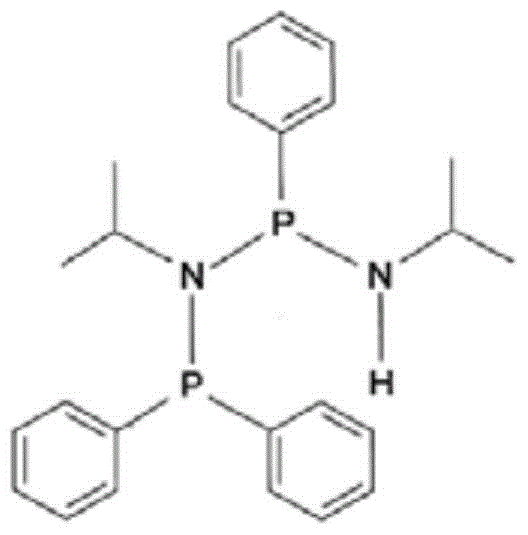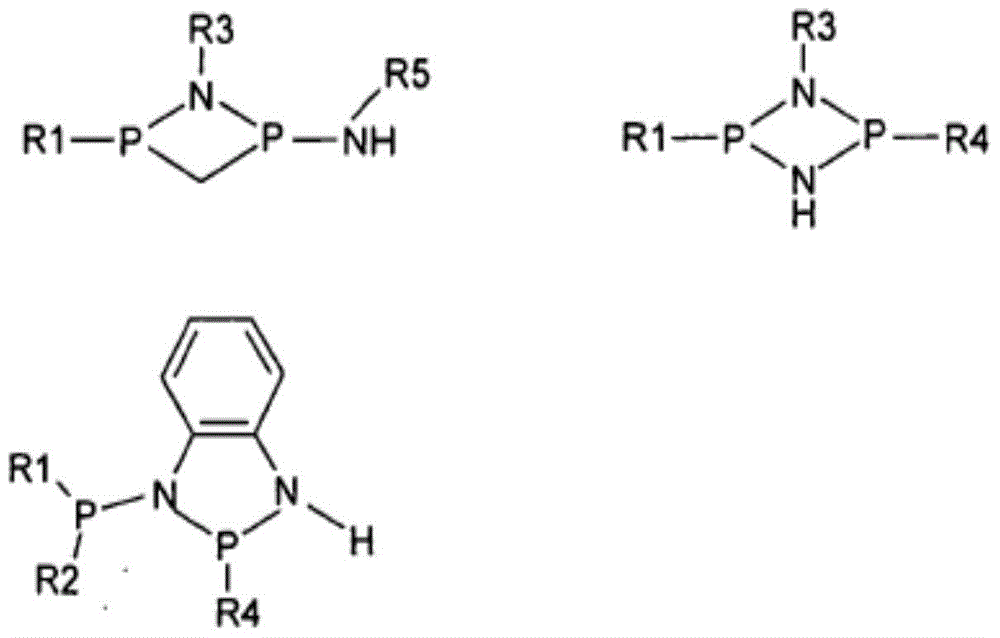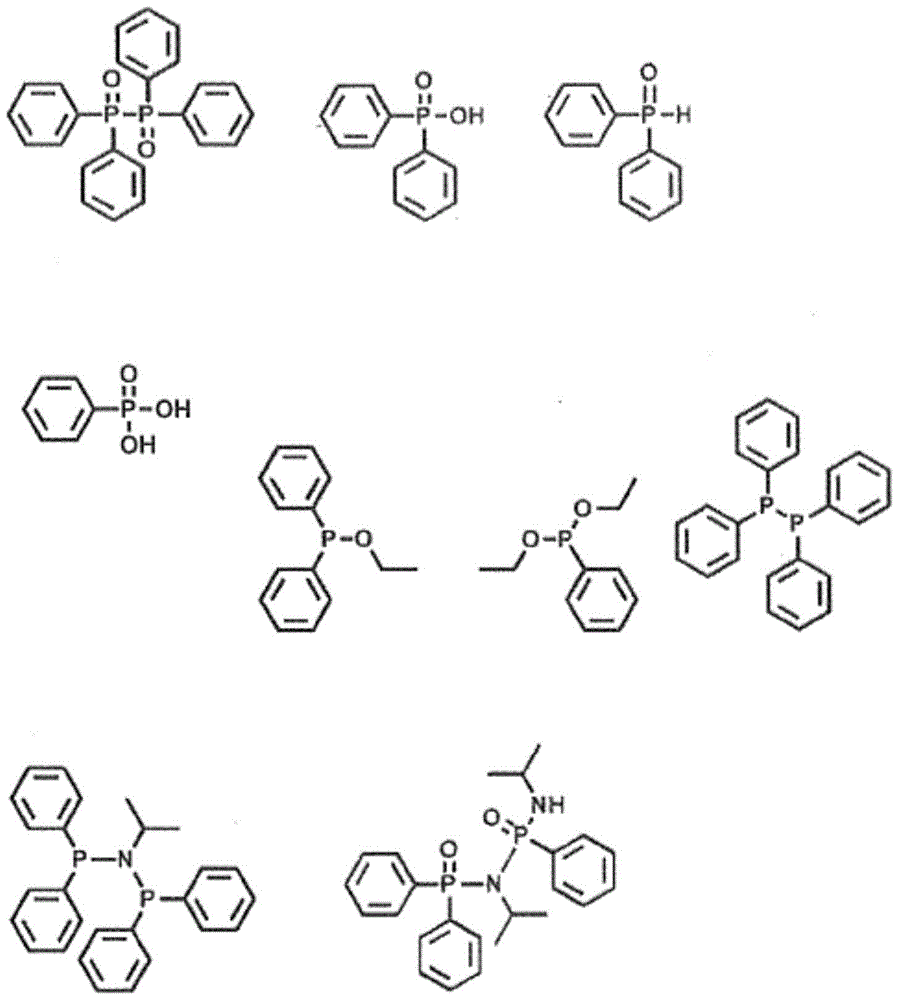Method for purifying crude pnpnh compounds
A compound, R1R2P-N technology, applied in the field of purification of crude PNPNH compounds, can solve problems such as failure
- Summary
- Abstract
- Description
- Claims
- Application Information
AI Technical Summary
Problems solved by technology
Method used
Image
Examples
Embodiment 1
[0053] Example 1: Ligand preparation, laboratory scale
[0054] Preparation of bis(isopropyl-amino-)phenylphosphine (NPN)
[0055] To a stirred solution of isopropylamine (30ml, 352mmol) in diethyl ether (250ml) was added dichlorophenylphosphine (9.63ml, 71mmol, dissolved in 50ml diethyl ether) at 0°C over a period of 30min. After stirring for a total of 72 hours, the solution was filtered. The residue was washed with ether and the solvent was removed under vacuum. The remaining oil was distilled at 0.2 Torr / 76-78°C to produce a colorless liquid with a yield of 33% (5.3 g). 31 P{H}NMR: 49.0ppm.
[0056] After synthesis in crude Ph 2 Some impurities found in the P-N(i-Pr)-P(Ph)-N(i-Pr)-H ligand are shown below.
[0057]
[0058] (Ph) 2 Preparation of PN(i-Pr)P(Ph)NH(i-Pr)(PNPN-H)
[0059] A solution of NPN species (2.4g, 10.7mmol) in tetrahydrofuran (10ml) was added dropwise to triethylamine (6ml) and chlorodiphenylphosphine (2.36g, 10.7mmol) in THF (40ml) at -40°C ) In the stirring ...
Embodiment 2
[0061] [Ph 2 PN(i-Pr)P(Ph)N(i-Pr)-Li] 2 Preparation
[0062] Will Ph 2 PN(i-Pr)P(Ph)N(i-Pr)-H (8.70g, 21.35mmol) was dissolved in 15ml of toluene. After cooling to -78°C, n-butyllithium (12.8ml, 2.5M n-BuLi in n-heptane, 32.0mmol) was added to the solution and the color immediately changed to orange / yellow. The solution was stirred at room temperature for another two hours and a colorless solid precipitated. The precipitate was filtered and washed 3 times with 5 ml of toluene. The remaining solvent was removed under vacuum, resulting in a colorless powder. Yield: 6.73 g (76%). Molecular weight: 414.39g / mol[C 24 H 29 LiN 2 P 2 ]. Elemental analysis: calculated value: C 69.56%, H 7.05&, N 6.76%; found: C 69.25%, H 7.06%, N 6.87%. Melting point: 187-189°C. 1 H NMR(THF-d 8 )δ=7.50-7.57 (m, 6H, aryl-H), 7.20-7.34 (m, 6H, aryl-H), 7.02 (m, 2H, aromatic), 6.93 (m, 1H, aryl- H), 3,70(m, 1H, CHCH 3 ), 3.58(m, 1H, CHCH 3 ), 1.39 (d, J = 6.47 Hz, 3H, CHCH 3 ), 1.25(d, J=6.23Hz, 3H, CH...
Embodiment 3
[0063] Example 3: Ligand purification via metallation of PNPN-H ligand and subsequent reprotonation
[0064] The crude ligand (8.70 g, 21.35 mmol) was dissolved in 15 ml of toluene. Under cooling, n-butyllithium (12.8ml, 2.5M n-BuLi in n-heptane, 32.0mmol) was added to the solution and the color immediately changed to orange / yellow. The solution was stirred at room temperature for another two hours, and a colorless solid precipitated. The precipitate was filtered and washed with 5 ml of toluene. The residue and ammonium chloride (1.70 g, 32 mmol) were suspended in toluene. The suspension was stirred for 10 h. Filtration produces a toluene solution of purified ligand, which can be used in catalytic reactions without further treatment. Alternatively, the solvent was removed in vacuum, yielding 5.41 g (62%). Molecular weight: 408.19g / mol[C 24 H 30 N 2 P 2 ]. Elemental analysis: calculated value: C 70.57%, H 7.40%, N 6.86%; found: C 70.50%, H 7.35%, N 6.87%.
[0065] In addition...
PUM
| Property | Measurement | Unit |
|---|---|---|
| melting point | aaaaa | aaaaa |
Abstract
Description
Claims
Application Information
 Login to View More
Login to View More - R&D
- Intellectual Property
- Life Sciences
- Materials
- Tech Scout
- Unparalleled Data Quality
- Higher Quality Content
- 60% Fewer Hallucinations
Browse by: Latest US Patents, China's latest patents, Technical Efficacy Thesaurus, Application Domain, Technology Topic, Popular Technical Reports.
© 2025 PatSnap. All rights reserved.Legal|Privacy policy|Modern Slavery Act Transparency Statement|Sitemap|About US| Contact US: help@patsnap.com



